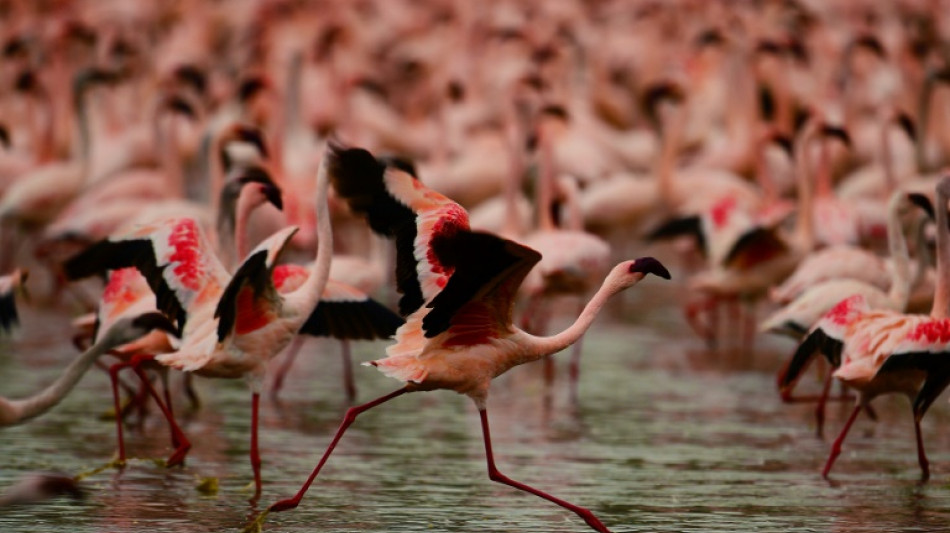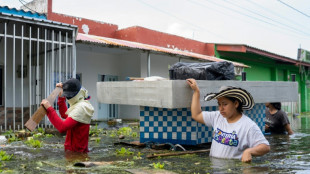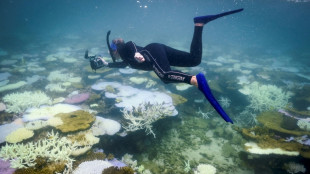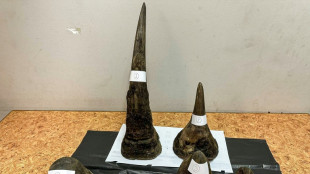
-
 No excuses for Shiffrin after Olympic team combined flop
No excuses for Shiffrin after Olympic team combined flop
-
Pool on wheels brings swim lessons to rural France

-
 Europe's Ariane 6 to launch Amazon constellation satellites into orbit
Europe's Ariane 6 to launch Amazon constellation satellites into orbit
-
Could the digital euro get a green light in 2026?

-
 Spain's Telefonica sells Chile unit in Latin America pullout
Spain's Telefonica sells Chile unit in Latin America pullout
-
'We've lost everything': Colombia floods kill 22

-
 Farhan propels Pakistan to 190-9 against USA in T20 World Cup
Farhan propels Pakistan to 190-9 against USA in T20 World Cup
-
US to scrap cornerstone of climate regulation this week

-
 Nepal call for India, England, Australia to play in Kathmandu
Nepal call for India, England, Australia to play in Kathmandu
-
Stocks rise but lacklustre US retail sales spur caution

-
 Olympic chiefs let Ukrainian athlete wear black armband at Olympics after helmet ban
Olympic chiefs let Ukrainian athlete wear black armband at Olympics after helmet ban
-
French ice dancers poised for Winter Olympics gold amid turmoil

-
 Norway's Ruud wins error-strewn Olympic freeski slopestyle
Norway's Ruud wins error-strewn Olympic freeski slopestyle
-
More Olympic pain for Shiffrin as Austria win team combined

-
 Itoje returns to captain England for Scotland Six Nations clash
Itoje returns to captain England for Scotland Six Nations clash
-
Sahara celebrates desert cultures at Chad festival

-
 US retail sales flat in December as consumers pull back
US retail sales flat in December as consumers pull back
-
Bumper potato harvests spell crisis for European farmers

-
 Bangladesh's PM hopeful Rahman warns of 'huge' challenges ahead
Bangladesh's PM hopeful Rahman warns of 'huge' challenges ahead
-
Guardiola seeks solution to Man City's second half struggles

-
 Shock on Senegalese campus after student dies during police clashes
Shock on Senegalese campus after student dies during police clashes
-
US vice president Vance on peace bid in Azerbaijan after Armenia visit

-
 'Everything is destroyed': Ukrainian power plant in ruins after Russian strike
'Everything is destroyed': Ukrainian power plant in ruins after Russian strike
-
Shiffrin misses out on Olympic combined medal as Austria win

-
 EU lawmakers back plans for digital euro
EU lawmakers back plans for digital euro
-
Starmer says UK govt 'united', presses on amid Epstein fallout

-
 Olympic chiefs offer repairs after medals break
Olympic chiefs offer repairs after medals break
-
Moscow chokes Telegram as it pushes state-backed rival app

-
 ArcelorMittal confirms long-stalled French steel plant revamp
ArcelorMittal confirms long-stalled French steel plant revamp
-
New Zealand set new T20 World Cup record partnership to crush UAE

-
 Norway's Ruud wins Olympic freeski slopestyle gold after error-strewn event
Norway's Ruud wins Olympic freeski slopestyle gold after error-strewn event
-
USA's Johnson gets new gold medal after Olympic downhill award broke

-
 Von Allmen aims for third gold in Olympic super-G
Von Allmen aims for third gold in Olympic super-G
-
Liverpool need 'perfection' to reach Champions League, admits Slot

-
 Spotify says active users up 11 percent in fourth quarter to 751 mn
Spotify says active users up 11 percent in fourth quarter to 751 mn
-
AstraZeneca profit jumps as cancer drug sales grow

-
 Waseem's 66 enables UAE to post 173-6 against New Zealand
Waseem's 66 enables UAE to post 173-6 against New Zealand
-
Stocks mostly rise tracking tech, earnings

-
 Say cheese! 'Wallace & Gromit' expo puts kids into motion
Say cheese! 'Wallace & Gromit' expo puts kids into motion
-
BP profits slide awaiting new CEO

-
 USA's Johnson sets up Shiffrin for tilt at Olympic combined gold
USA's Johnson sets up Shiffrin for tilt at Olympic combined gold
-
Trump tariffs hurt French wine and spirits exports

-
 Bangladesh police deploy to guard 'risky' polling centres
Bangladesh police deploy to guard 'risky' polling centres
-
OpenAI starts testing ads in ChatGPT

-
 Three-year heatwave bleached half the planet's coral reefs: study
Three-year heatwave bleached half the planet's coral reefs: study
-
England's Buttler calls McCullum 'as sharp a coach as I ever worked with'

-
 Israel PM to meet Trump with Iran missiles high on agenda
Israel PM to meet Trump with Iran missiles high on agenda
-
Macron says wants 'European approach' in dialogue with Putin

-
 Georgia waiting 'patiently' for US reset after Vance snub
Georgia waiting 'patiently' for US reset after Vance snub
-
US singer leaves talent agency after CEO named in Epstein files

| SCS | 0.12% | 16.14 | $ | |
| RYCEF | 3.04% | 17.41 | $ | |
| RIO | -0.56% | 96.31 | $ | |
| RBGPF | 0.12% | 82.5 | $ | |
| CMSC | 0.02% | 23.59 | $ | |
| NGG | 0.06% | 88.44 | $ | |
| GSK | -0.1% | 58.95 | $ | |
| RELX | 0.66% | 29.675 | $ | |
| AZN | 3.19% | 194.198 | $ | |
| BTI | -2.51% | 59.65 | $ | |
| VOD | -0.99% | 15.329 | $ | |
| JRI | 0.08% | 12.82 | $ | |
| BCC | 1.28% | 90.17 | $ | |
| BCE | 1.33% | 25.965 | $ | |
| CMSD | 0.08% | 23.99 | $ | |
| BP | -6.92% | 36.68 | $ |

Future of Africa's flamingos threatened by rising lakes: study
The lakes where Africa's flamingos congregate in spectacular numbers are producing less food for the iconic birds as their water levels rise, researchers said Friday, threatening the survival of a much-loved species.
Three-quarters of the world's lesser flamingos live in East Africa and more than a million birds at a time can gather at lakes in huge "flamboyances" for feeding and courtship.
But as these lakes expand to record highs, scientists have discovered they produce less of the unique algae upon which flamingos rely, putting at risk a species already in decline.
This is driving the distinctive, pink-plumed birds away from their usual habitats into unprotected areas in search of food, said Aidan Byrne, lead author of the research.
"They might be able to move elsewhere, but they could be lost from the region that they're currently in at these key feeding lakes," said Byrne, a PhD student jointly supervised by King's College London and the Natural History Museum.
Flamingos use their specialised beaks to feed on a particular type of algae that exists in salty, alkaline waters known as soda lakes.
These lakes are concentrated in Kenya, Tanzania and Ethiopia and despite being harsh landscapes, certain species -- including the flamingo and the algae they feast on -- have adapted to thrive there.
- 'Iconic species' -
But the lakes have risen to levels not seen in decades, driven in part by increased rainfall linked to climate change over the catchment areas.
This has greatly diluted the alkalinity and salinity of the water at these soda lakes.
Byrne and other researchers wanted to study the impact that had on biodiversity and found a "massive decline" in concentrations of the very algal blooms upon which flamingos survive.
Earlier studies had looked at the problem but its extent was not known until now, he said.
"We were surprised at the scale of the changes, and how much the flamingo habitats are threatened," he told AFP.
Erratic and extreme rainfall predicted for East Africa in future would only make the problem worse and "increase the threat to the species within the region", he added.
The study, published in the journal Current Biology, is the first to use satellite imagery to observe all 22 of the soda lakes that host flamingos across the East African region.
This was combined with climate records and bird observation data over more than 20 years.
The sharpest drops in algae concentrations were observed in Kenya, including at Nakuru, one of the most important flamingo feeding lakes in Africa known for hosting million-strong "flamboyances".
It expanded by roughly 90 percent between 2009 and 2022 while algal concentration halved.
Lake Bogoria and Lake Elmenteita, also tourist magnets for their brilliant flamingo displays, experienced steep declines as well.
And where algal blooms declined, so too did flamingo numbers, Byrne said, putting in doubt revenue from tourism as well.
Flamingo habitats in East Africa are protected whereas outside these ranges monitoring would be difficult and other threats -- including from humans -- could emerge, he said.
"They're just such an iconic species that are unique to these environments. If they're lost, it would be devastating," Byrne said.
A.Mahlangu--AMWN


